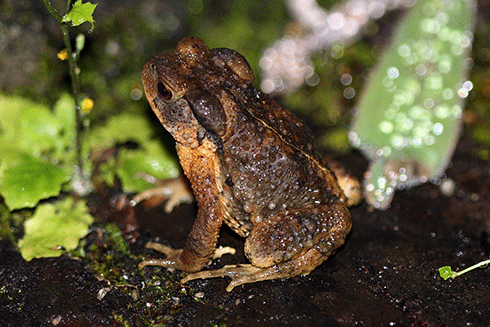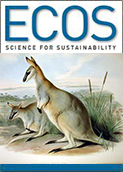
|
Published: 10 June 2014
Visit from cane toad cousin coincides with calls to strengthen biosecurity
The discovery of an introduced Asian black-spined toad in a Sunbury backyard, just 15 km from Melbourne airport, has coincided with calls for Australia to strengthen its biosecurity frameworks for keeping out invasive animals and plants.

|
|
An Asian black-spined toad was found sitting in a dog’s water bowl in a Sunbury backyard. Credit:
Arthur Chapman
|
The Invasive Species Council has expressed alarm at a recent finding of a newly introduced toad in an outer Melbourne suburb that tolerates cooler climates than the cane toad.
The council says the Asian black-spined toad could devastate native wildlife and, as the latest in a long list of breaches of Australia’s borders, it highlights serious systemic failings in environmental biosecurity.
‘The Asian black-spined toad, a species with all the insidious characteristics of its better known cousin, the cane toad, has never before been found in Australia outside of a major airport or waterside dock,’ said Andrew Cox, Invasive Species Council CEO.
‘If established, the Asian black-spined toad would multiply the destructive forces of the cane toad and open up a more southern invasion front.’
Biosecurity staff are investigating whether the Sunbury finding is a one-off sighting, although evidence of breeding won’t be available until next summer.
The news of the recent stowaway comes at a time where the NSW government is updating its regulatory framework for biosecurity.
The new framework places a greater emphasis on the responsibility of everyone who deals with biosecurity to keep introduced species out of Australia.
The Nature Conservation Council of NSW says that, while it will help modernise the state’s approach to weeds, pests and feral animals, they would like to see more detail on how the framework will deal with the environmental impact of introduced species as they become established.
‘Resolving the varied and complex threats posed by weeds, pests and feral animals needs some statutory certainty rather than relying entirely on regulations and guidelines,’ said CEO of the Nature Conservation Council of NSW, Pepe Clark.
‘There needs to be a statutory role for community, farmer and local government representatives overseeing the implementation of the biosecurity regime, just as occurs through the NSW bushfire coordinating committee.’
Source: Invasive Species Council



